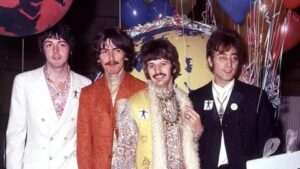
His Journey Highlights The Significance Of Support, The Power Of Music As A Healing Force, And The Importance Of Open Conversations About Mental Health.

In a candid revelation that has resonated deeply with fans and mental health advocates alike, Paul McCartney has opened up about his experiences with depression following the breakup of The Beatles. This acknowledgment sheds light on a lesser-discussed aspect of the iconic band’s legacy—how fame, success, and sudden change can impact mental health. McCartney’s insights not only humanize a music legend but also provide a valuable perspective on the emotional struggles faced by artists in the spotlight.
The Weight of a Legacy.
The Beatles’ breakup in 1970 marked the end of an era for one of the most influential bands in music history. For McCartney, who was an integral part of the group’s creative force, the dissolution felt like the loss of a family. “I felt like I’d lost my identity,” he recalled, reflecting on the emotional turmoil that ensued. Transitioning from being part of a cultural phenomenon to navigating life as a solo artist was daunting, and it triggered feelings of isolation and uncertainty.
The pressures of fame can be overwhelming, and for McCartney, the transition was particularly challenging. He felt the weight of expectations—both from fans and from himself—to replicate the success of The Beatles. This pressure compounded feelings of inadequacy and self-doubt, which are common struggles for many artists facing major life changes.
A Journey Through Darkness.
In his candid discussions, McCartney has described periods of deep sadness that followed the breakup. “There were times when I was really down, feeling lost,” he admitted. His experiences are a testament to the reality that even those who appear successful and accomplished can grapple with mental health issues. This aspect of McCartney’s story is a reminder that depression does not discriminate; it can affect anyone, regardless of their achievements.
Music became both a refuge and a challenge during this time. While songwriting provided an outlet for his emotions, it also served as a reminder of what he had lost. McCartney explored various themes in his solo work, often reflecting on love, loss, and the complexities of life. Songs from his early solo albums, like “Maybe I’m Amazed,” capture the raw emotion of his struggles, resonating with listeners who may be experiencing similar feelings.
Finding Support and Healing.
McCartney’s journey through depression highlights the importance of seeking support during difficult times. He eventually found solace in his family and friends, recognizing that connection is vital for healing. “Talking about it helps,” he noted, emphasizing the significance of open conversations about mental health.
In recent years, the conversation surrounding mental health has gained momentum, and public figures like McCartney are helping to normalize these discussions. By sharing his experiences, he encourages others to seek help and foster open dialogue about mental health challenges. His willingness to be vulnerable has made a meaningful impact, particularly for fans who look up to him as a role model.
The Power of Music as Therapy.
For many artists, music serves as a powerful tool for healing. McCartney’s return to songwriting was not only a way to cope but also a means to rediscover his creative voice. As he navigated through his emotional struggles, he channeled his experiences into his music, creating songs that resonate with the universal themes of love, loss, and resilience.
The healing power of music is well-documented, and for McCartney, it became a lifeline. Albums like “Band on the Run” and “Ram” showcase a newfound freedom and a journey toward recovery, blending personal introspection with the infectious melodies that have defined his career. Each note and lyric reflect a triumph over adversity, embodying the message that it’s possible to emerge from dark times stronger and more authentic.
Inspiring a New Generation.
As McCartney continues to share his story, he inspires a new generation of musicians and fans to prioritize mental health. His openness about depression serves as a reminder that vulnerability can lead to strength and healing. It encourages conversations about mental health that are crucial for breaking down stigma and fostering understanding.
In an era where mental health awareness is increasingly important, McCartney’s reflections resonate deeply. His experiences remind us that even legends face personal struggles, and that it’s okay to seek help and talk about our feelings. By shining a light on his journey, McCartney not only honors his own path but also paves the way for others to find hope in their darkest moments.
Conclusion.
Paul McCartney’s candid exploration of depression following The Beatles’ breakup offers a profound look at the emotional complexities of fame and personal loss. His journey highlights the significance of support, the power of music as a healing force, and the importance of open conversations about mental health. As he continues to inspire through his music and his story, McCartney serves as a beacon of hope for anyone navigating their own struggles, reminding us that even in darkness, there is a path to light and healing.







